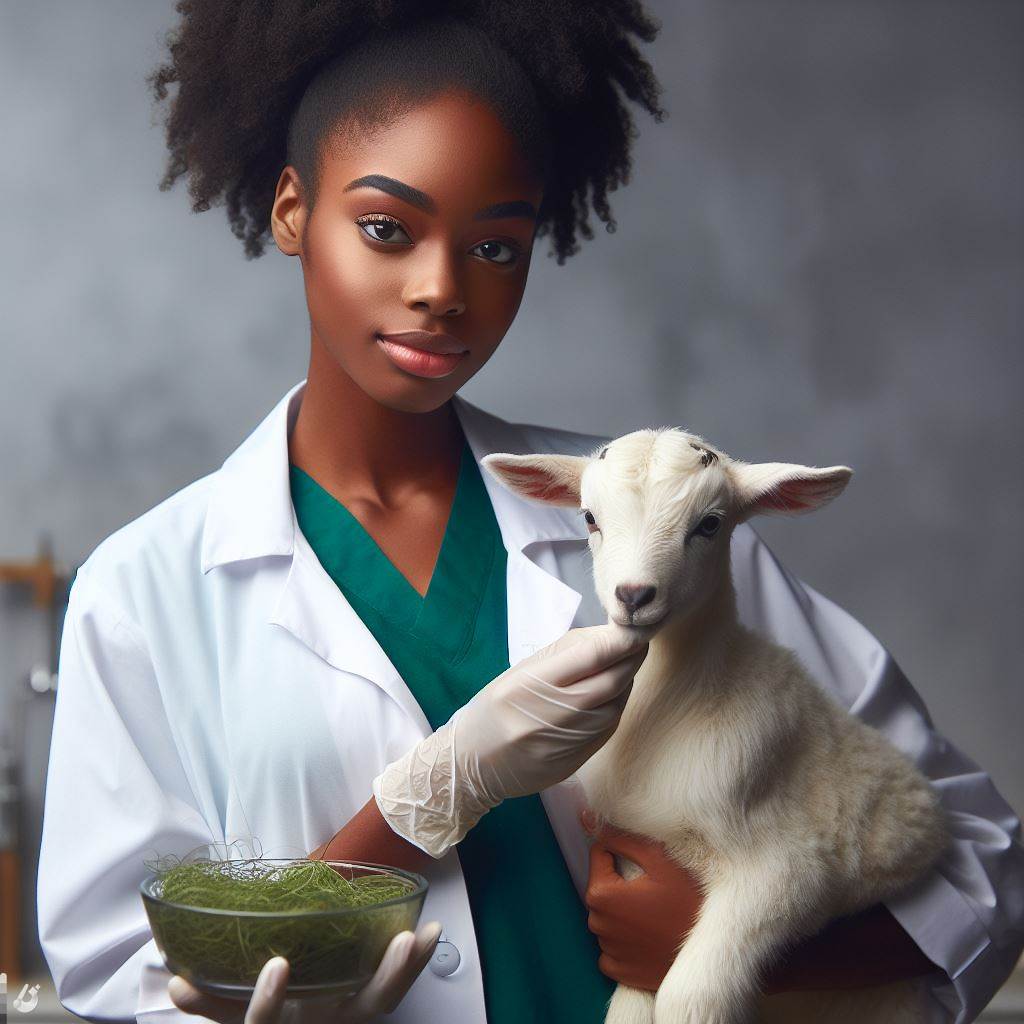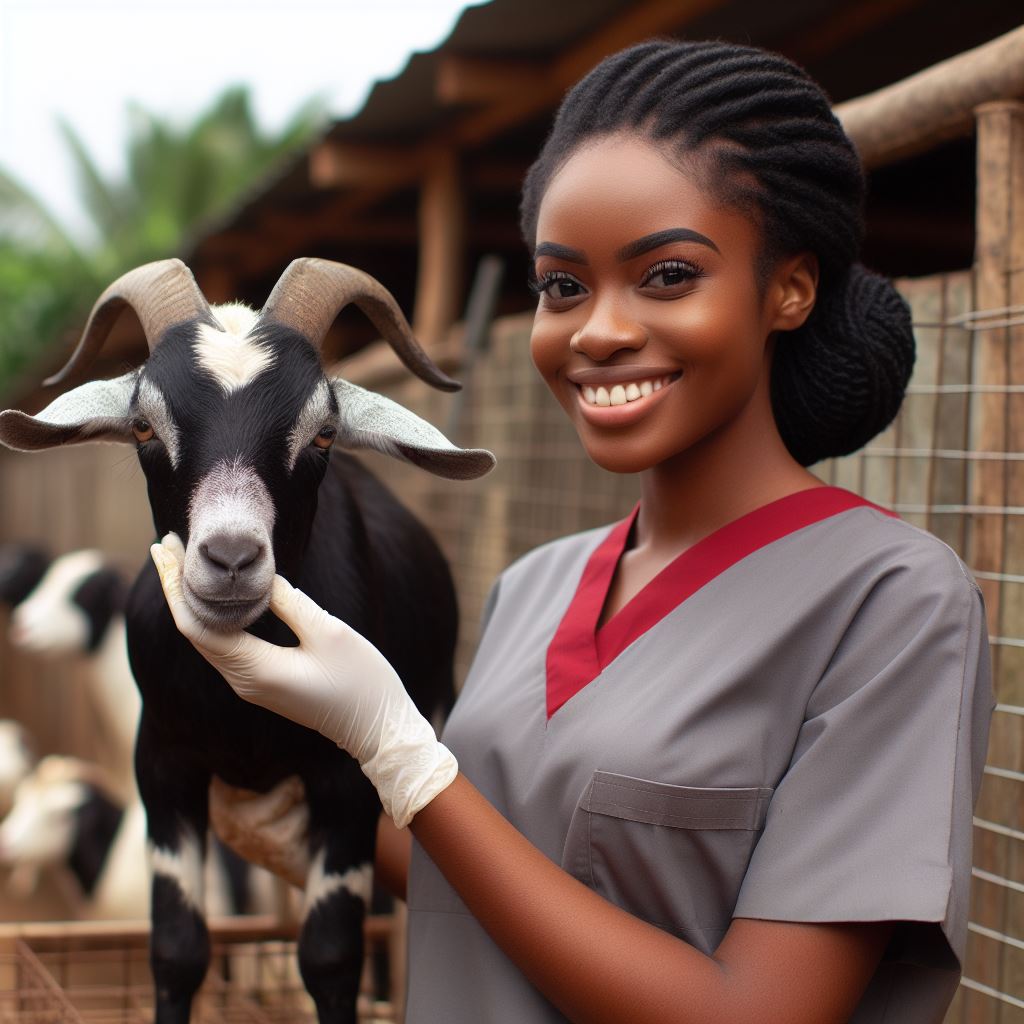Introduction
Importance of Animal Science in Nigeria
Animal science in Nigeria holds pivotal significance, deeply embedded in agriculture’s fabric.
Livestock constitutes a fundamental part of Nigeria’s agricultural sector, contributing significantly to the economy, food security, and livelihoods.
Overview of the Current State of Animal Science in Nigeria
Currently, animal science in Nigeria faces a blend of challenges and opportunities.
Challenges encompass inadequate infrastructure, limited access to modern technology, and fluctuating market dynamics. However, amidst these challenges lie promising prospects.
There’s a burgeoning interest in adopting innovative practices, enhancing breed quality, and optimizing animal nutrition for increased productivity.
Purpose and Scope of the Blog Post
The purpose of this blog post is to dissect the trends and prospects shaping the future of animal science in Nigeria.
It seeks to shed light on emerging technologies, sustainable practices, and policy initiatives revolutionizing the sector.
Through this exploration, readers will gain insights into the potential pathways for advancement and development within Nigeria’s animal science domain.
This blog aims to delve into various aspects, including advancements in animal health, the integration of precision agriculture, the role of biotechnology, and the impact of climate change on livestock farming.
Furthermore, it intends to highlight success stories, innovative projects, and initiatives contributing to the growth and modernization of animal science in Nigeria.
By presenting a comprehensive view, this blog intends to serve as a guiding resource for stakeholders, policymakers, researchers, and individuals passionate about transforming Nigeria’s animal science landscape.
It aspires to foster a deeper understanding of the challenges faced and the promising avenues available, aiming to propel the sector towards sustainable growth and enhanced contributions to Nigeria’s overall agricultural development.
Historical Overview of Animal Science in Nigeria
Early development and indigenous practices
Animal science in Nigeria traces back to ancient times, with indigenous people practicing traditional animal husbandry methods.
Indigenous practices involved rearing various livestock species such as cattle, sheep, goats, and chickens for sustenance.
Primitive tools, such as traditional huts and locally made equipment, were used for rearing and managing animals.
These early practices contributed to the development of livestock production knowledge and indigenous animal genetic resources.
Influence of colonial rule on animal science
The arrival of the colonial powers in Nigeria significantly influenced the development of animal science.
Colonial administrators introduced modern animal husbandry techniques and established experimental farms across the country.
British breeds of livestock, particularly cattle, were imported to improve local breeds and enhance productivity.
Western educational institutions also played a pivotal role in training Nigerians in modern animal science practices.
Post-independence advancements and challenges
After gaining independence, Nigeria saw advancements in animal science in various areas.
The establishment of research institutes and universities focused on animal science facilitated further development.
Breeding programs were initiated to improve local livestock breeds and enhance meat, milk, and egg production.
Technological advancements, such as artificial insemination, improved breeding systems and genetic selection methods.
However, challenges such as inadequate funding, limited infrastructure, and inadequate policy implementation hindered progress.
Outbreaks of diseases, such as the Avian Influenza and African Swine Fever, also posed significant challenges to the industry.
Despite challenges, Nigeria recognizes the importance of animal science in attaining food security and economic growth.
The government is implementing policies to promote research and development, capacity building, and sustainable production systems.
Read: Comparing Architectural Technology to Architecture in Nigeria
Current Trends in Animal Science in Nigeria
Modernization of livestock farming techniques
Livestock farmers in Nigeria are embracing modern techniques to improve productivity and profitability.
This includes the use of improved breeds, better housing facilities, and advanced feeding systems.
Modernization also involves the use of artificial insemination and embryo transfer techniques for breeding.
Adoption of technology and innovative practices
Nigerian animal scientists are incorporating technology into their research and farming practices.
They are utilizing precision farming techniques, such as GPS and remote sensing, for better resource management.
Furthermore, they are using innovative practices like hydroponic fodder production and vertical farming.
Increase in commercialization and industrialization of animal production
The animal production industry in Nigeria is witnessing a shift towards commercialization and industrialization.
Livestock farming is no longer limited to subsistence levels; it has become a profitable business venture.
This trend has led to the emergence of large-scale commercial farms and the growth of value-added animal product industries.
Integration of animal science with other fields
Animal science is now being integrated with other disciplines to address various challenges.
Researchers are collaborating with environmental scientists to develop sustainable livestock production systems.
Transform Your Career with Expert Guidance
Get personalized mentorship consulting that’s tailored to your unique path. Our expert advice is actionable and exclusive.
Get StartedAnimal science is also being linked with genetics, nutrition, and veterinary medicine to enhance animal health and productivity.
Read: Comparing Animal Science Programs: Nigeria vs. the World
Challenges in Animal Science in Nigeria
Lack of sufficient funding and infrastructure
- Inadequate financial support hinders the growth and development of animal science in Nigeria.
- Insufficient funds limit the establishment of modern facilities and infrastructure for research and education.
- The lack of proper infrastructure and equipment leads to inefficient animal husbandry practices.
- Insufficient funds also result in the absence of advanced technologies and machinery for animal research and production.
- Without proper funding, it becomes challenging to attract qualified researchers and experts in the field of animal science.
Limited research and development activities
- Nigeria faces a scarcity of research activities focusing on animal science, limiting the advancement of knowledge.
- Lack of research contributes to the absence of innovative solutions to address animal health and production challenges.
- Limited research activities hinder the improvement of animal breeds and the development of new feed formulations.
- Without adequate research, the country’s animal science sector struggles to keep up with global advancements.
- Limited research opportunities also hinder the discovery and development of new pharmaceuticals and vaccines for animal diseases.
Insufficient human resources and skilled manpower
- The shortage of qualified professionals in animal science poses a significant challenge in Nigeria.
- The lack of skilled manpower leads to a gap in expertise required for efficient animal production and management.
- Insufficient human resources limit the implementation of best practices and innovative techniques in animal science.
- The scarcity of trained professionals affects the quality of education and research in animal science institutions.
- The brain drain phenomenon further exacerbates the shortage of skilled manpower in the country.
Environmental and sustainability concerns
- Nigeria’s animal science sector faces environmental challenges like deforestation, land degradation, and water pollution.
- Unsustainable animal production practices contribute to greenhouse gas emissions and climate change.
- Inadequate waste management systems in animal production facilities lead to environmental pollution.
- Environmental degradation affects animal health and has long-term implications for food security.
- Incorporating and promoting sustainable agriculture practices is crucial to address these environmental concerns.
Overall, Nigeria’s animal science sector encounters various challenges like insufficient funding, limited research activities, a shortage of skilled manpower, and environmental sustainability concerns.
Addressing these challenges will require strategic investments, increased funding, and focused efforts to promote research, education, and sustainable practices.
Only through these measures can Nigeria unlock the full potential of animal science and contribute to the growth and development of its agricultural sector.
Read: Animal Science Curriculum: What to Expect in Nigerian Varsities

Delve into the Subject: Best Practices for Sustainable Pasture Management in Nigeria
Opportunities and Prospects in Animal Science in Nigeria
Potential for increased domestic and international demand for animal products
Nigeria has a vast population, both in terms of humans and livestock.
With the growing population and changing dietary preferences, there is a huge potential for increased demand for animal products, such as meat, milk, eggs, and leather.
The rising middle-class population with higher purchasing power contributes to the increased demand for animal-based protein sources.
This presents a great opportunity for animal scientists to enhance production and meet the market demands.
Furthermore, Nigeria has the potential to export animal products to other countries, tapping into the global market.
By meeting international quality standards and ensuring sustainable production practices, Nigeria can significantly benefit from the export of animal products.
Embracing value addition and agribusiness opportunities
Animal scientists in Nigeria have the opportunity to embrace value addition in animal products.
By exploring processing and packaging techniques, they can cater to niche markets that prefer processed and value-added products.
For instance, developing ready-to-cook or ready-to-eat meat products, dairy-based desserts, and high-value leather goods can add value to animal products.
This not only increases profitability but also opens up opportunities for entrepreneurship and job creation in the agribusiness sector.
Through innovative ideas and market research, animal scientists can identify untapped areas of the market and develop unique products that cater to specific consumer preferences.
This adds diversity to the animal science field and ensures its sustainable growth.
Collaboration and partnerships with international organizations
Collaboration and partnerships with international organizations offer animal scientists in Nigeria access to knowledge, funding, and technology transfer.
These collaborations can provide support in research and development, capacity building, and technical expertise.
By working alongside renowned international institutions and organizations, Nigerian animal scientists can stay updated with the latest advancements in animal science and incorporate best practices into their work.
This promotes innovation, efficiency, and competitiveness in the industry.
Moreover, partnerships with international organizations also open doors for accessing global markets, attracting investments, and establishing networks for knowledge exchange.
These collaborations contribute to the overall growth and recognition of animal science in Nigeria.
Policy support and government initiatives for animal science
The Nigerian government recognizes the significance of animal science and has taken initiatives to support its growth.
Policies and programs aimed at improving animal health, welfare, and productivity provide a conducive environment for animal scientists to thrive.
Government-backed initiatives offer financial support for research, development, and technology adoption in the animal science sector.
These initiatives enable animal scientists to address key challenges and explore innovative solutions.
For instance, the establishment of research and training institutions, provision of grants, and implementation of livestock improvement schemes create a supportive ecosystem for animal scientists to excel.
Furthermore, government policies concerning livestock production, food safety, and quality assurance create a regulatory framework that ensures sustainable and responsible practices in animal science.
In general, the future of animal science in Nigeria holds immense opportunities and prospects.
With the potential for increased domestic and international demand for animal products, embracing value addition and agribusiness, collaboration with international organizations, and support from government initiatives, animal scientists in Nigeria can play a pivotal role in the growth and development of the industry.
Read: A Detailed Overview of Crop & Environmental Protection in Nigeria
Discover More: Top Seed Companies in Nigeria and Their Contributions
Future Directions for Animal Science in Nigeria
Promoting research and development in the field
Research and development are crucial for the growth and advancement of animal science in Nigeria.
The government and private sectors must invest more in research to address the specific challenges faced by the industry.
Efforts should be made to establish research centers and collaborations between universities, research organizations, and farmers.
This will lead to the development of innovative solutions and technologies to improve animal health, nutrition, and productivity.
Strengthening education and training programs
Education and training play a vital role in building a skilled workforce and ensuring the future success of animal science in Nigeria.
There is a need to enhance the quality of education programs by updating curricula to include the latest advancements in the field.
Universities and colleges should establish partnerships with industry professionals to provide practical training opportunities for students.
Scholarships and financial support should also be provided to encourage more students to pursue careers in animal science.
Emphasizing sustainable practices and animal welfare
In the face of environmental challenges and growing concerns over animal welfare, it is crucial for Nigeria to prioritize sustainable practices and animal welfare in animal science.
This will not only benefit the animals but also ensure the long-term viability of the industry.
Farmers should be educated on sustainable production techniques, including efficient resource utilization and waste management.
Animal welfare regulations and standards must be established and enforced to prevent cruelty and ensure the ethical treatment of animals.
Encouraging entrepreneurship and innovation
Entrepreneurship and innovation are key drivers of growth and economic development.
Nigeria should create an environment that fosters entrepreneurship in the animal science industry, encouraging individuals to pursue innovative business ideas.
Support should be provided to aspiring entrepreneurs through funding, mentorship programs, and access to markets.
Innovation hubs and incubators can be established to facilitate the development of new technologies and startups in the field.
In a nutshell, the future of animal science in Nigeria holds immense potential.
By promoting research and development, strengthening education and training programs, emphasizing sustainable practices and animal welfare, and encouraging entrepreneurship and innovation, Nigeria can build a thriving animal science sector that benefits both its economy and its people.
Gain More Insights: Sustainable Livestock Farming Practices in Nigeria
Conclusion
Recap of key points discussed
Throughout this blog post, we have explored various trends and prospects in the field of animal science in Nigeria.
We discussed the importance of this field in addressing the country’s food security challenges and its potential to contribute to economic growth.
Also, we highlighted the increasing demand for animal products and the need for sustainable production practices.
We also examined the role of technology and innovation in improving animal health, productivity, and welfare.
Optimistic outlook for the future of animal science in Nigeria
Despite the challenges, there is a positive outlook for the future of animal science in Nigeria.
The government’s efforts to prioritize agricultural development and invest in research and development are encouraging.
The growing interest of young professionals in animal science and veterinary medicine is also a promising sign.
With the right policies and support, Nigeria can become a leading player in animal science, contributing to both national and global food security.
Call to action for stakeholders and policymakers
To harness the full potential of animal science in Nigeria, it is crucial for stakeholders and policymakers to take action.
They should prioritize investment in research and development, facilitate knowledge transfer and collaboration, and promote sustainable agricultural practices.
Furthermore, there should be a focus on capacity building and training programs to enhance the skills of professionals in the field.
Partnerships between the government, academia, and industry should be strengthened to promote the exchange of ideas and expertise.
By working together and taking proactive measures, we can ensure a bright future for animal science in Nigeria and drive sustainable agricultural development in the country.
Let’s seize this opportunity and pave the way for a thriving livestock sector that benefits both farmers and consumers.




